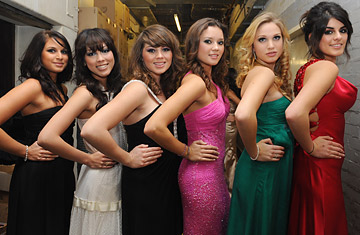
Contestants from King's College get ready for the next round of the Miss University London beauty contest, at the Crystal Club, London. From left: Jenny Leys, Tia Roberts, Kate Carter, Izabella Nerushay, Julia Theresa Heller, Natali Naeini
Sometime past midnight at London's Crystal Night Club, the lights dim and the DJ drops a mellow beat. Right on cue, Julia Theresa Heller, a leggy 19-year old, struts across the stage in her bid to become Miss King's College 2008. "I'm originally from Germany and I love chocolate," she says to the judges, flashing a toothy smile as blinding as her blonde locks. "Just like me it's sweet, and definitely bad for you." When asked by the emcee to describe the superpower she'd most like to possess, Heller, a business management student, doesn't skip a beat: "I'd really like the ability to answer this question." (Read the Top 10 oddball news stories.)
Replete with glib responses, sequined gowns and layer upon layer of foundation, the beauty pageant is thriving at London's most elite universities. More than 400 women from institutions such as King's College, the London School of Economics and University College London applied to compete in six preliminary rounds, which started November 4, and culminate in the Miss University London finale in February 2009. Thus far, more than 2,000 people have paid £15 pounds ($22) to attend the events, held at Crystal, an underground nightclub frequented by Kevin Spacey and Paris Hilton.
The pageant's polarizing popularity has some undergraduates up in arms, and they're expressing their dissent over what they consider the exploitation of student bodies. "It's like a cattle market," says Elly James, a women's officer at the School of Oriental and African Studies. "Contestants had to have their waists and breasts measured. I come from quite a rural area and that's what they do to animals."
Last month, James and her outraged peers launched Miss-Ogynist University of London — a campaign that calls for the "degrading" pageant to be scrapped before its grand finale. Three-hundred people have joined the Facebook group, and together they have organized debates and rallies in London, and convinced several student unions to ban pageant advertisements on campus because they violate the "safe space" policy of various university charters. Feminist ire isn't just directed at pageant organizers either. They also point the finger at contestants who they feel possess a false sense of emancipation. "Their attention-seeking is completely misplaced," says Ruby Buckley, a women's officer at LSE. "They are parading up and down and being leered at by men who have paid money to judge them on how they look." (Read a TIME story about Facebook.)
Christian Emile, the 22-year old founder of 121 Entertainment, the events company behind Miss University London and weekly party nights at clubs throughout London, claims the pageant instills confidence in the contestants, and does not promote the objectification of women. "We're not about girls coming out in bikinis and skanky outfits like at fashion shows or other pageants," he says. "We're creating a glamorous night out for the girls." To that end, there is no swimsuit competition, all evening gowns must touch the floor, and, despite the cattle comparisons, organizers say they don't measure breasts and waistlines.
Even so, 30 demonstrators stood outside of the King's College heat this week chanting "Shame, shame, shame on King's, women are not sex things." At other events, banners and placards were even more biting: "SOAS is here for our education, not your ejaculation."
Emile agrees, pointing out that all of the contestants attend university and arguing that brains are central to the event. In whittling down the field from 70 applicants to 15 contestants for each pageant, organizers "got a sense of what each girl is about" with questions that revealed their character and intellect, such as "Which Sex and the City character do you most relate to?" and "What is the best rumor you've heard about yourself?" Furthermore, Emile has said he will donate at least £1,500 ($2,240) to British charities that support breast cancer research. But, according to the opposition, throwing money at a worthy issue can't compensate for the harm that the contest exacts on women in general and on cancer victims in particular. "One of the biggest problems facing women with breast cancer is that they lose their hair and their breasts," James says. "They can't live up to the image of beauty this pageant promotes."
The six preliminary events have now been decided, but this ugly row over beauty will doubtlessly continue. For now, some may take solace in the crowning of Tia Roberts, a third year law student, as Miss King's 2008. On stage, she spoke of her ambitions to become a human rights lawyer, made references to the works of Jane Austen and dispelled myths about her Thai background. "Before you ask," Roberts told the judges, "I'm not a ladyboy or a mail-order bride." In that sense, the pageant just might have slayed some stereotypes after all.
